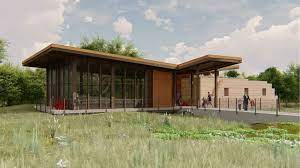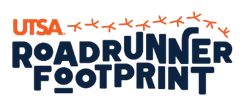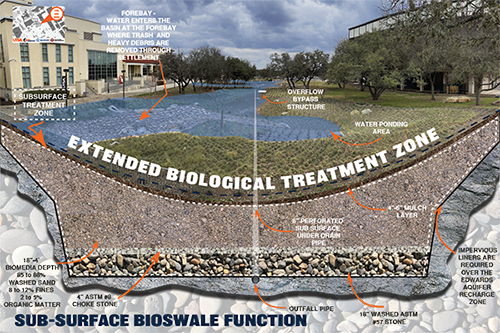Grants
2017
Roof top Harvesting and Stormwater Disbursement over the Edwards Aquifer Recharge Zone: A Retrofit for Previously Untreated Impervious Cover
Award amount: $1,057,401
The original design of the Main Campus called for stormwater to be conveyed away from the property through a system of storm drains and open swales that ultimately outfall into Leon Creek.
108 acres of UT San Antonio's original impervious cover predates current regulatory compliance for water quality and impervious cover treatment which included the area treated by this project. That hardscape is considered Previously Untreated Impervious Cover (PUIC). The bioswale located between the Main Campus Convocation Center and the H-E-B Student Union retrofits 9.5 acres of PUIC. The bioswale removes pollutant load, slows stormwater to attenuate downstream flow and serves as an outdoor living laboratory for outdoor education.
Through the grant the project accomplished the following objectives:
- Bring the project area into compliance with today’s standards through highly visible, low impact development (LID) features
- Monitor the efficacy of LID features and their ability to remove solids and pollutants, reduce heat and provide aesthetic alternative stormwater treatments
- Develop a cost analysis of the Best Practicable Means (BPMs)
- Provide educational signage and outdoor classroom
- Capture Edwards water on-site from rooftops and utilize it vs. an irrigation system for irrigation
Texas Commission on Environmental Quality, Alternative Fueling Facilities Program (AFFP)
Amount awarded: $400,000
The Texas Commission on Environmental Quality invests in alternative fuels to reduce pollutants and improve air quality. The university owns a natural compressed gas alternative fuels filling station originally installed in the early 1990s. The compressors for the station were incompatible with modern tanks. The grant award facilitated an upgrade of the facility to increase the compressor size and add workflow software.
2018
Water Quality in the Leon Creek Watershed Recharge Zone as a Function of Urban Development, and Community Education of the Threats and Conservation of the Edwards Aquifer

Award amount: $2,671,236
Proposition 1 is the Edwards Aquifer Protection Venue Project authorized by the City of San Antonio to continue the watershed and preservation project. The Mesquite Living Lab (MLL) supports the Environmental Science Department’s outreach mission and was funded by $2,671,236 of Proposition 1 funding awarded to the Office of Sustainability and the Integrated Biology Department.
The MLL and its surrounding areas are used to illustrate how low impact developments (LIDs) can improve water quality. These LIDs include a bioswale, green roof and rain garden. The building is used to educate the community on the benefits of water quality and water conservation of the Edwards Aquifer. Workshops are held for community members, including homeowners and landowners, to help them understand what they can do to protect the aquifer.
2019
City of San Antonio TREE- Tree Mitigation and Planting

Award amount: $50,000
The City of San Antonio Tree mitigation policy allows developers to pay a fee for removal of tree canopy where protection of trees is not possible, such as on small developments where there is only enough room for the building and parking lot. These funds are then used to plant trees in other places around the city.
The university was awarded $50,000 from the mitigation fees to plant approximately 80 trees along sidewalks to provide shade, sound attenuation along buildings and reduce heat island effect.
This grant provided over 80 trees to the Main and Downtown campuses. The tree canopy added shade value, sound attenuation, carbon reduction, and campus beautification while helping to reduce urban heat island effect.
2020
RoadRunner Footprint (Congestion Mitigation and Air Quality)

Amount Awarded: $407,000
The Congestion Mitigation and Air Quality Improvement Program (CMAQ) is a fund made possible by the Bipartisan Infrastructure Law (BIL) and managed the US Department of Transportation’s Federal Highway Association dedicated to, as its name suggests, congestion mitigation and air quality improvement.
The RoadRunner Footprint program is an active transportation and travel demand project. The program analyzes campus transportation methods and infrastructure and recommends policy for the creation of complete streets at the university. Over a three year period, the Roadrunner Footprint program will establish programs and initiatives to increase active transportation on all campuses. The goals of the program focus on the last mile commute to create a better student experience. The project will establish policy, create positive messaging through social media and throughout campus communications, produce a sustainable transportation master plan and develop programs and events that positively reinforce alternative transportation.
Some projects funded by the grant include the establishment of the Tito Bradshaw Bicycle Repair Shop, the 2022 Beakcycle Program and the mobile bike shop. To learn more about these projects made possible by this grant, head over to the Active Transportation Programs section of our page.
2022
Texas Parks & Wildlife Department’s Habitat Conservation Plan (TPWD HCP)
Award amount: $724,000
The broadly stated objective of the Cooperative Endangered Species Conservation Fund (CESCF) was to assist in development of programs for the conservation of endangered and threatened species or to assist in monitoring the status of candidate species and recovered species. Texas Parks & Wildlife has been actively involved with this program since its inception. In 2022, the Office of Sustainability applied for and was successfully awarded $724,000 to carry out its Habitat Conservation Plan (HCP).
The grant would initially be used to evaluate the needs, costs and benefits of a HCP and develop a recommendation for a solution that would meet the legal requirements of section 10 of the ESA and its implementing regulations, including development of appropriate avoidance, minimization and mitigation measures for impacts to the Covered Species and consideration of the unique aspects of critical habitat within the proposed HCP area.
The grant would also be used for vetting the analysis and recommended conservation strategies with stakeholders, seeking additional biological review, developing a complete HCP and assisting in the preparation of the National Environmental Policy Act (NEPA) documentation, if desired by USFWS.
The university anticipates that as a result of the development and approval of an HCP the institution would establish a long-term, Urban Karst Research Lab program dedicated to studying the Covered Species to address existing gaps in scientific knowledge about population dynamics and habitat requirements.
The HCP would provide for the conservation of the Covered Species and enable long-term information gathering about the species that could drive future conservation efforts in the region, particularly in and around the UTSA campus.
SIT! (Seated Infants and Toddlers)
Award amount: $70,000
According to the National Highway Traffic Safety Administration, three out of four car seats are not properly installed. Common child safety seat errors include installing the seats too loosely, putting the harness straps through the wrong slots, leaving the harness straps too loose, positioning the chest clip incorrectly and using the wrong seat belt path.
The Texas Department of Transportation’s SIT! (Seated Infants & Toddlers) grant aims to improve infant and toddler safety in vehicles through the distribution of child safety car seats to San Antonio residents. TxDot Executive Director James Bass reaffirms the agency’s efforts, stating, “We are determined to educate parents and caregivers in Texas about the importance of buckling their child and into the correct car seat for their age and size.”
The award amount of $70,000 was used to host community outreach events including car seats checks and installation, purchase approximately 250 car seats for distribution and to hire a grant specific project manager.
